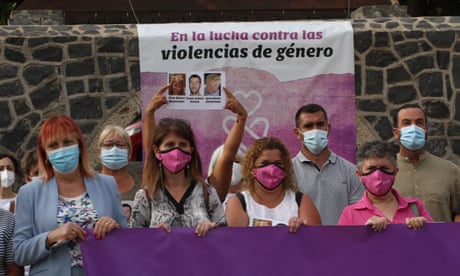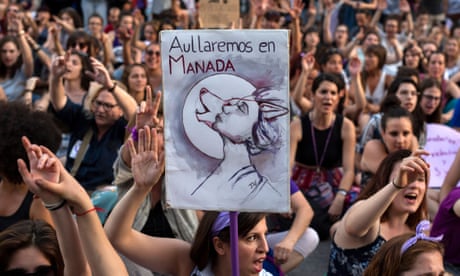Spain calls second emergency meeting over murders of six more women
Government convenes domestic violence experts after killings of six women and a young girl this month

The Spanish government has called a second emergency meeting of domestic violence experts in less than a month after the murders of six women and a young girl since the start of January, and as it considers a plan to let abused women know if their partners have been convicted of violent offences.
The crisis committee was last assembled after the murders of 11 women in December.
On Monday, a 45-year-old woman and her eight-year-old daughter were murdered in the north-western Spanish province of Valladolid. Their killings came five days after a 38-year-old woman was murdered in the Catalan province of Lleida.
The latest deaths bring the number of women murdered by their partners or ex-partners to 1,188 since 2003, when the government began recording such murders. Over the same period, 49 children have been murdered in domestic violence attacks. In 2022, 49 women were killed by their partner or ex-partner, while 43 women died in such attacks in 2021.
“So far this January, six women and an eight-year-old girl have been murdered by sexist violence,” Spain’s equality minister, Irene Montero, tweeted on Monday afternoon.
“The equality ministry is calling a crisis committee meeting at 10am this Friday to analyse each case in detail, to find out what went wrong, to improve coordination – and to make sure we always get there in time.” The meeting will be attended by officials from the equality, interior and justice ministries, and by representatives from Spain’s self-governing regions.
Faced with a sharp increase in such murders, Spain’s Socialist-led government is studying proposals that would permit the authorities to inform women who are victims of domestic violence of their partners’ previous convictions.
However, Spain’s public prosecutor for violence against women has warned that such warnings could not be issued “automatically or in a generalised way”, adding that the specific circumstances of each case would need to be considered.
Last month, the government called on courts and prosecutors to step up the use of electronic bracelets to help protect women whose former partners were subject to restraining orders.
“We think it’s important to promote the use of electronic devices, such as bracelets that alert women to the presence of aggressors,” the justice minister, Pilar Llop, said at the end of December. “Since 2009, when these bracelets were brought in, no woman wearing one has been murdered.” Llop said it was also important to tackle those who denied the “scourge” of gender-based violence.
However, opposition parties have accused the government of failing to protect women by introducing controversial legislation that has allowed some convicted sex offenders to have their sentences reduced on appeal.
Spain’s “only yes means yes” law – which was brought in following widespread anger over the “wolfpack” gang-rape in Pamplona in 2016 – has made consent a key factor in sexual assault cases.
But it has also revised the scope of potential minimum and maximum prison sentences, allowing some convicted sex offenders to appeal against their sentences and have them reduced. By the end of December, 129 convicted offenders had benefited from the sentencing changes.
The deputy dean of the Madrid bar association told El País recently that lawyers’ concerns over the “undesired” consequences of the new law had gone unheeded, and Alberto Núñez Feijóo, the leader of the conservative People’s party, called the legislation “a legal bodge”.
The Pamplona attack – known as the “wolf pack” case after the name the rapists gave themselves – shocked Spain and provoked a fierce debate over its sexual offences legislation.
There were protests around the country after the judges presiding over the original trial cleared the five of gang-rape and convicted them only of the lesser charge of sexual abuse.
In June 2019, Spain’s supreme court overturned the regional court’s verdict, ruled that the men had committed rape, and raised their sentences from nine to 15 years each.
In September that year, protesters took to the streets of more than 250 towns and cities across Spain to declare a “feminist emergency” after a series of high-profile rape cases and a summer in which 19 women were murdered by current or former partners.



No hay comentarios:
Publicar un comentario